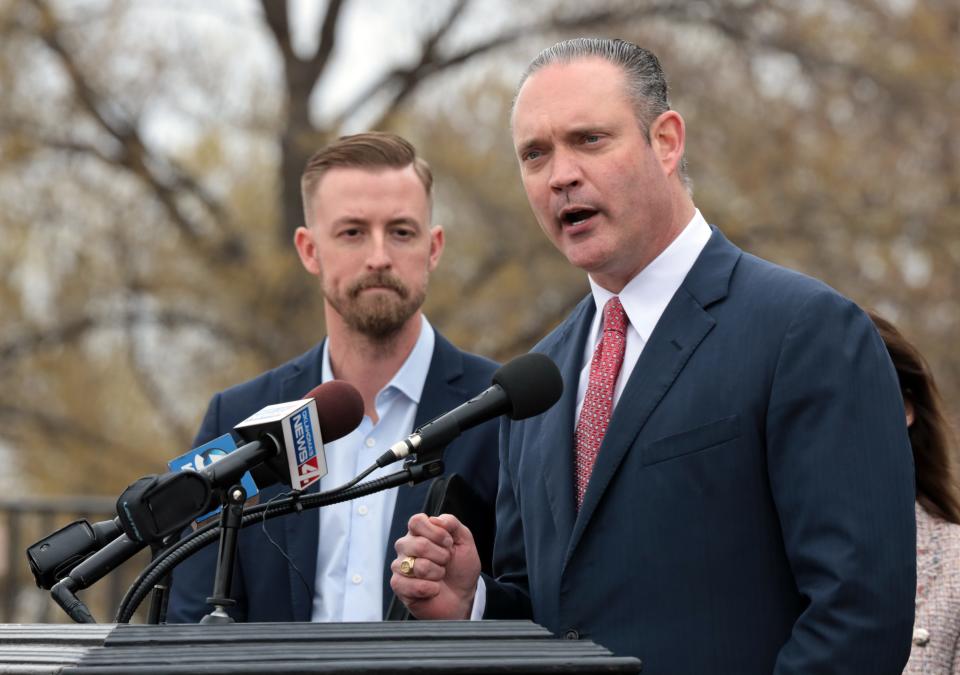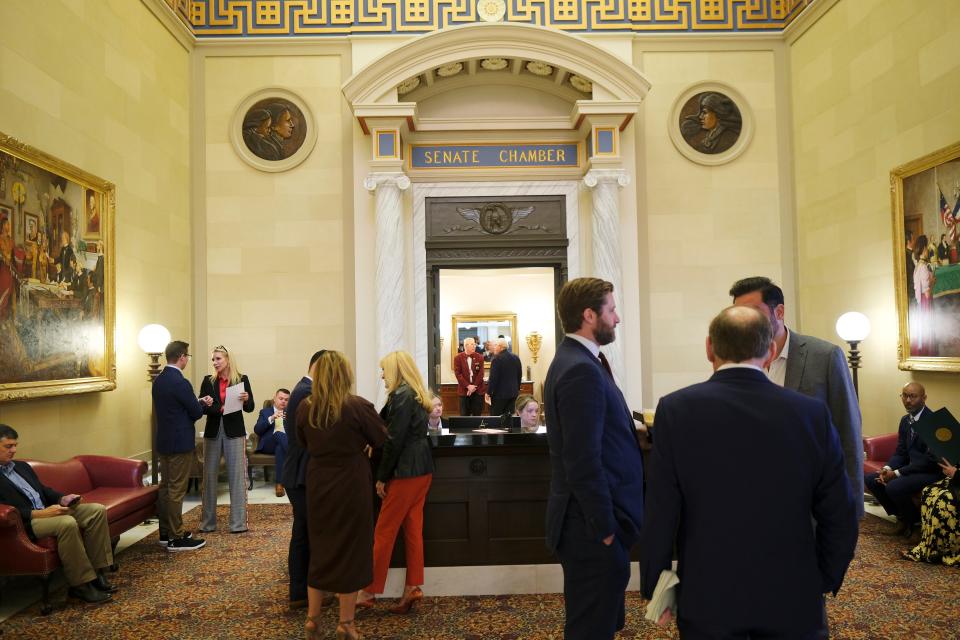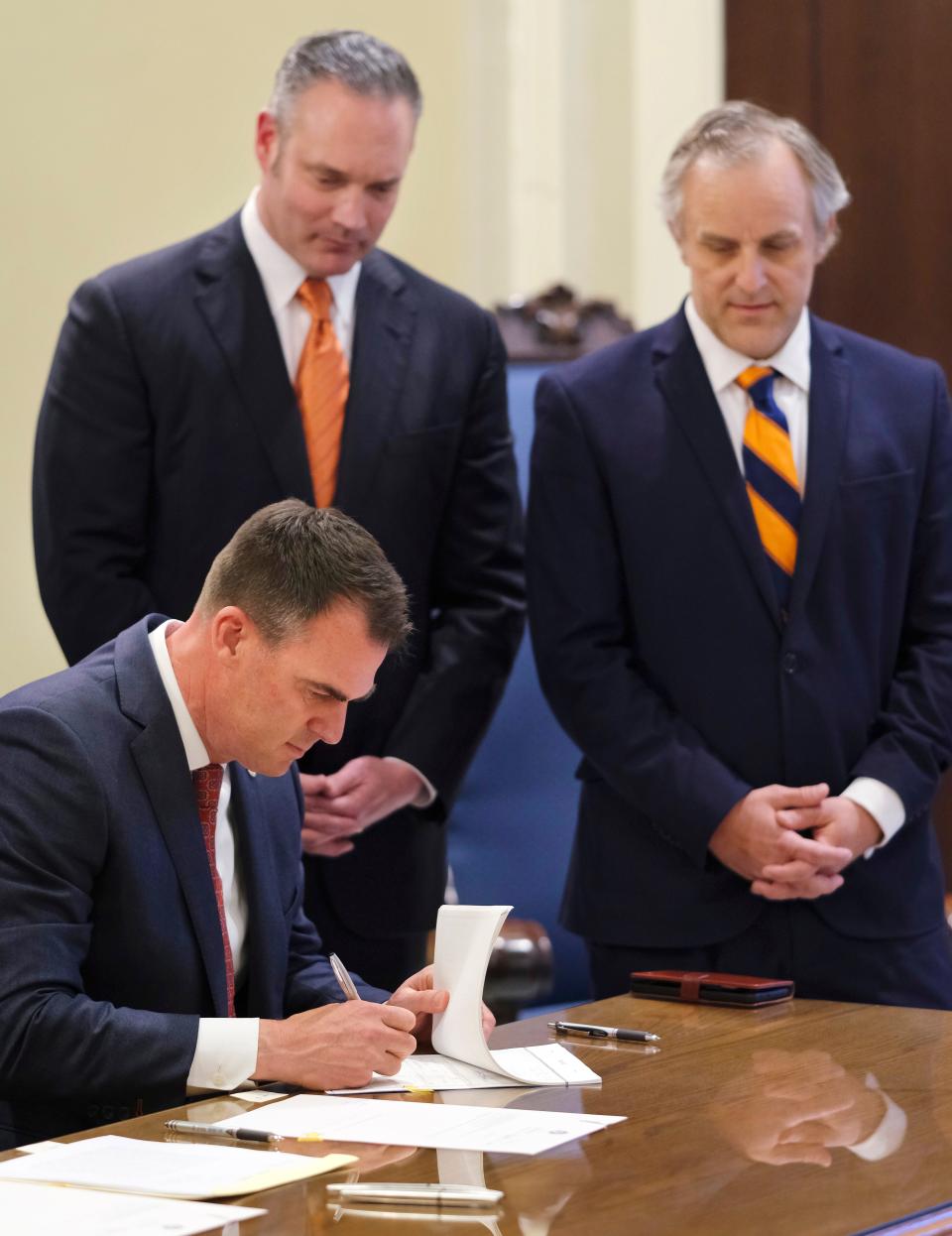Why some Oklahoma parents who homeschool their children are not in favor of state support
When Kevin Collins visited the Oklahoma state Capitol this year to advocate on behalf of his homeschool association, the Lawton parent who had homeschooled his own two children had a simple yet to-the-point message for lawmakers:
“I said, 'Thank you for your support, now please just leave us alone,'” Collins recalled.
The fact that Collins and other homeschool families wanted the state government to stay out of their affairs was unsurprising, as much of the movement has been built on a push to separate education from government oversight.
But Collins likely raised a few eyebrows when he weighed in on the proposed tax credit for home-school families to use on educational costs.
“I told them we don’t want it,” Collins said. “It’s such a slippery slope.”

The number of students being taught at home has risen significantly nationwide since the COVID-19 pandemic caused many school buildings to close for several months. Some conservatives also have pushed a narrative of public schools as indoctrination factories, causing parents to question what their children are being taught.
By some counts, that growth has been largest in Oklahoma, where one national estimate puts the state’s homeschool student population at more than 100,000.
Oklahoma's growing homeschool community also has become more diverse, observers say. Most families may no longer be largely composed of those seeking home-based education because of religious or anti-government motivations. Some see it as a convenience, especially with the rise in remote work and the pandemic showing many families they could teach their children at home.
More: The mediator and the wonks: How an elusive education deal happened in the Oklahoma Legislature
Lawmakers approved a refundable tax credit for homeschooled families

State lawmakers targeted the growing homeschool community this year in its aggressive school choice package, which offers families of private school students a $7,500 refundable tax credit and a $1,000 tax credit for homeschool students.
Collins, who is on the board of Homeschool Oklahoma, a Christian organization that advocates for homeschool families, said his group opposed the tax credits because they fear it could be followed by more constraints on how homeschool students are taught.
“Let’s say I’m going to use a Christian-based curriculum, but what if the state next year says you can’t use any type of Christian education if you are using state money?” Collins theorized. “It’s a Pandora's box or a crack in the door that will be hard to stop, and that’s what we are scared about.”
Many political observers might scoff at the idea that Oklahoma’s Republican-controlled state Legislature or Department of Education would restrict a parent’s ability to use a religious curriculum. State schools Superintendent Ryan Walters has openly pushed for public schools to adopt Christian education and prayer.
But some families were motivated to homeschool because of a deep distrust of the government.
"It always worries me when the government knocks on your door and says we're going to give you something," said Jana Belcher, who has homeschooled her children for over 20 years and opposed the tax credits.
More: Why state schools Supt. Ryan Walters sees an opening to push Christianity in schools
Homeschool numbers are difficult to track

Counting the number of homeschooled students in Oklahoma is difficult because the state does not require any registry. A parent or guardian can homeschool their child without notifying the state.
Some organizations estimated Oklahoma’s homeschool population before the pandemic at about 22,000 using the national average of 3.3%.
A U.S. Census report from 2020 claimed 20% of Oklahoma families were now homeschooling their children, which would put the number at about 120,000.
Many education observers believe that number is high and that some parents likely told the Census Bureau they were homeschooled when they were enrolled in a virtual charter school, a sector that has also grown. But national data indicates Oklahoma's homeschool community may have doubled in recent years.
“In response to government lockdowns about health concerns, the number of homeschool students in the United States skyrocketed,” wrote Brian Ray, a researcher with the National Home Education Research Institute. “There were an estimated 2.6 million homeschool students in grades K to 12 in March of 2020, then 4.5 to 5.0 million in March of 2021.”
The Oklahoman spoke with seven families who began homeschooling since the pandemic. None wanted to be named in an article, but they shared reasons for taking their children out of public or private school to be taught at home.
While some said they did it for religious reasons — "We can pray before every lesson," one mother said — one family said they were concerned about what books their child would be exposed to in public school and cited some of the claims Walters has made about pornography being prevalent in school libraries.
More: Stitt backs Ryan Walters' controversial rules on pornography, parent rights
Multiple families said homeschooling was more convenient, especially with a parent now working from home.
Most families said they wanted to receive the $1,000 refundable tax credit to help pay for their curriculum or to form a local homeschool group.
"With more families choosing (homeschooling), I think it makes sense that we get to use some of (our) tax dollars for our education," one mother said.
Will tax credits come with strings attached?

Collins said the recent growth in homeschool families, especially among those not motivated by religious or anti-government reasons, might mean many are happy to accept the tax credit.
"We want to educate more families on why the state needs to stay out," Collins said.
But some supporters of homeschooling being included in the tax credit have criticized Collins and his organization.
The Oklahoma Council for Public Affairs, a conservative think tank that publishes a blog and advocates for tax dollars to go to private education, recently said some groups were upset that more Oklahomans were choosing to homeschool.
"Not all homeschool groups are glad to see the movement become larger and more diverse. It threatens their political clout to have too many homeschool families who see the world differently than they do," Trent England wrote in a May blog post for the council. "Consider that no homeschool family would be required to claim the school choice tax credit. It would be a choice. Those who oppose it are trying to stop other families from having that choice. They are trying to keep it harder to homeschool."
Belcher, a homeschool parent who opposed the tax credit, agreed that many new homeschool families might not be as concerned about government intrusion as families were decades ago.
But she said the tax credit was an expansion of government that many conservative groups claim to oppose.
"It expands government into private education that has historically and notoriously been privately funded," Belcher said. "When you spend (government) money on something, that something has to be held accountable."
This article originally appeared on Oklahoman: How helpful is the Oklahoma homeschool tax credit? Parents disagree

